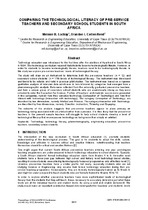| dc.contributor.author | Luckay, Melanie B. | |
| dc.contributor.author | Collier-Reed, Brandon I. | |
| dc.date.accessioned | 2014-07-24T10:19:38Z | |
| dc.date.available | 2014-07-24T10:19:38Z | |
| dc.date.issued | 2012 | |
| dc.identifier.citation | Luckay, M.B. & Collier-Reed, B.I. (2012) Comparing the technological literacy of pre-service teachers and secondary school students in South Africa. Proceedings of EDULEARN12 Conference, Barcelona, Spain | en_US |
| dc.identifier.issn | 2340-1117 | |
| dc.identifier.uri | http://hdl.handle.net/10566/1132 | |
| dc.description.abstract | Technology education was introduced for the first time after the abolition of Apartheid in South Africa in 1994. The technology curriculum required that students become technologically literate. However, in order for students to become technologically literate, teachers need to be technologically literate. In this study we explore pre-service teachers’ levels of technological literacy. The study will draw on an instrument to determine both the pre-service teachers’ (n = 12) and secondary school students’ (n = 179) levels of technological literacy. The instrument was developed and found to be reliable and valid in previous pilot studies. The instrument was based on a rigorous qualitative analysis of interview data which was in turn informed by categories that emerged from a phenomenographic analysis. Data were collected from the university graduated pre-service teachers, and from a unique group of secondary school students who are academically strong as they were selected to enter the Exposition for Science. Profiles of teachers’ and students’ scores were generated in two categories, namely how they conceive technology (Conception of Technology) and how they interact with technology (Interaction with technology). The category Conception of Technology, are described by two dimensions, namely Artefact and Process. The category Interaction with Technology, are described by four dimensions, namely, Direction, Instruction, Tinkering and Engaging. The outcome of the analysis suggests that pre-service teachers appear to place primacy on technology being associated with an artefact rather than a process. It is thus likely that the pre-service teachers in the present sample teachers will struggle to help school students develop a level of technological literacy that encompasses technology as being more than simply an artefact. | en_US |
| dc.language.iso | en | en_US |
| dc.publisher | IATED | en_US |
| dc.rights | IATED. Permission granted to reproduce the article in the Repository. Please cite original source and link to this site. | |
| dc.subject | Technology | en_US |
| dc.subject | Technology literacy | en_US |
| dc.subject | Phenomenography | en_US |
| dc.subject | Engineering education | en_US |
| dc.subject | Pre-service teacher | en_US |
| dc.subject | Secondary school students | en_US |
| dc.title | Comparing the technological literacy of pre-service teachers and secondary school students in South Africa | en_US |
| dc.type | Conference Proceedings | en_US |
| dc.privacy.showsubmitter | false | |
| dc.status.ispeerreviewed | true | |
| dc.description.accreditation | Web of Science | en_US |

